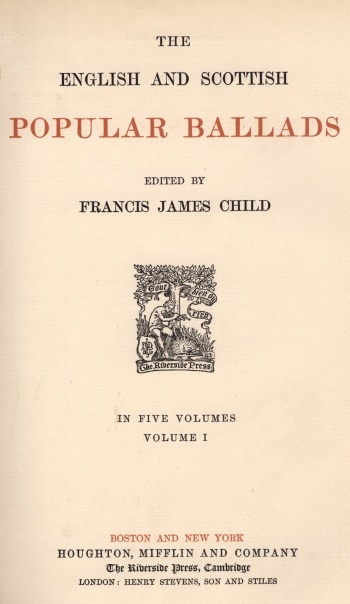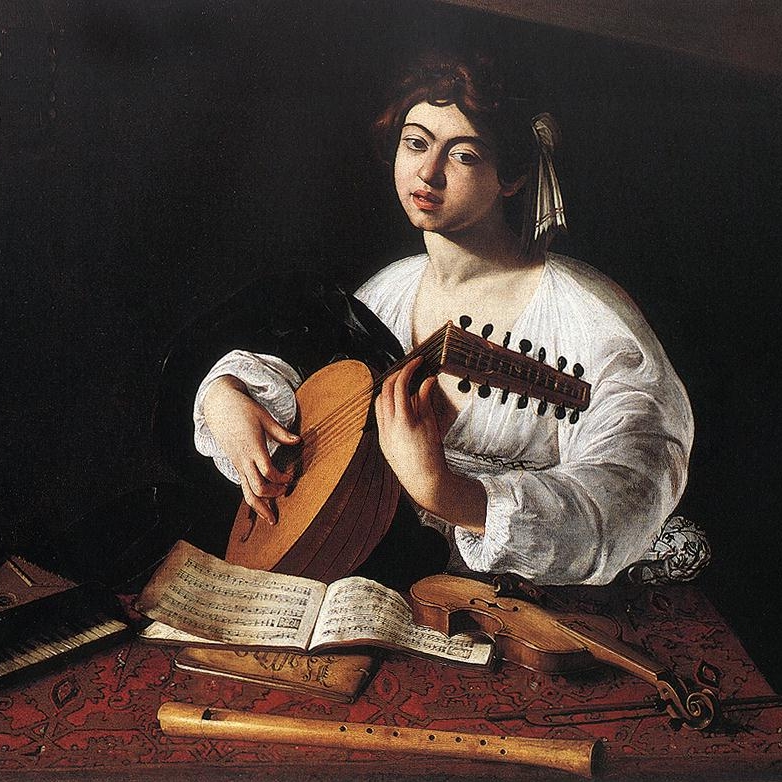In order to preserve the historical integrity of the ballads in this section they are presented in their original dialects, which span a broad range. These ballads have been passed down through the centuries from many different regions of Great Britain before appearing in print. A synopsis of each ballad, in modern American English, is provided to aid in ease of comprehension of the dialects.
Glasgerion was a kings owne sonne,
And a harper he was good;
He harped in the kings chamber,
Where cuppe and candle stoode,
And soe did hee in the queens chamber,
Till ladies waxed wood.
And then bespake the kings daughter,
And these words thus sayd shee:
Saide, "Strike on, strike on, Glasgerrion,
Of thy striking doe not blinne;
There's never a stroke comes over thin harpe
But it glads my hart within."
"Faire might you fall, lady!" quoth hee;
"who taught you now to speake?
I have loved you, lady, seven yeere;
My hart I durst neere breake."
"But come to my bower, my Glassgerryon,
When all men are att rest;
As I am a ladie true of my promise,
Thou shalt bee a welcome guest."
But hom then came Glassgerryon,
A glad man, Lord, was hee:
"And come thou hither, Jacke, my boy,
Come hither unto mee.
"For the kings daughter of Normandye,
Her love is granted mee,
And beffore the cocke have crowen,
Att her chamber must I bee."
"But come you hither, master," quoth hee,
"Lay your head downe on this stone;
For I will waken you, master deere,
Afore it be time to gone."
But upp then rose that lither ladd,
And did on hose and shoone;
A collar he cast upon his necke;
Hee seemed a gentleman.
And when he came to that ladies chamber,
He thrild upon a pinn;
The lady was true of her promise,
Rose up and lett him in.
He did not take the lady gay
To boulster nor to bedd,
But downe upon her chamber-flore
Full soone he hath her layd.
He did not kisse that lady gay
When he came nor when he youd;
And sore mistrusted that lady gay
He was of some churles blood.
But home then came that lither ladd,
And did of his hose and shoone,
And cast that coller from about his necke;
He was but a churles sonne:
"Awaken," quoth hee, "my master deere,
I hold it time to be gone.
"For I have sadled your horsse, master,
Well bridled I have your steed;
Have not I served a good breakfast,
When time comes I have need."
But up then rose good Glasgerryon,
And did on both hose and shoone,
And cast a coller about his necke;
He was a kinges sonne.
And when he came to that ladies chamber,
He thrild upon a pinn;
The lady was more than true of promise,
Rose up and let him in.
Saies, "Whether have you left with me
Your braclett or your glove?
Or are you returned backe againe
To know more of my love?"
Glasgerryon swore a full great othe,
By oake and ashe and thorne,
"Lady, I was never in your chamber
Sith the time that I was borne."
"O then it was your little foote-page
Falsly hath beguiled me:"
And then shee pulld forth a little kniffe,
That hanged by her knee,
Says, "There shall never noe churles blood
Spring from my body."
But home then went Glasgerryon,
A woe man, good Lord, was hee;
Sayes, "Come hither, thou Jacke, my boy,
Come thou hither to me.
"For if I had killed a man to-night,
Jacke, I wold tell it thee;
But if I have not killed a man to-night,
Jacke, thou hast killed three!"
And he pulld out his bright browne sword,
And dryed it on his sleeve,
And he smote off that lither ladds head,
And asked noe man noe leave.
He sett the swords poynt till his brest,
The pumill till a stone;
Thorrow that falsenese of that lither ladd
These three lives werne all gone.
The ballad Glasgerion appears in Volume II of The English and Scottish Popular Ballads, edited by Francis James Child. These volumes are in the public domain.

The Child Ballads are 305 traditional ballads from England and Scotland, and their American variants, anthologized by Francis James Child during the second half of the 19th century. ... Read more at Wikipedia.

Ballads were particularly characteristic of the popular poetry and song of the British Isles from the later medieval period until the 19th century. ... Read more at Wikipedia.